【精】初中英语时态综合复习讲练(含答案)
初中英语八大时态详解及专项训练(附答案)(期末复习资料)!
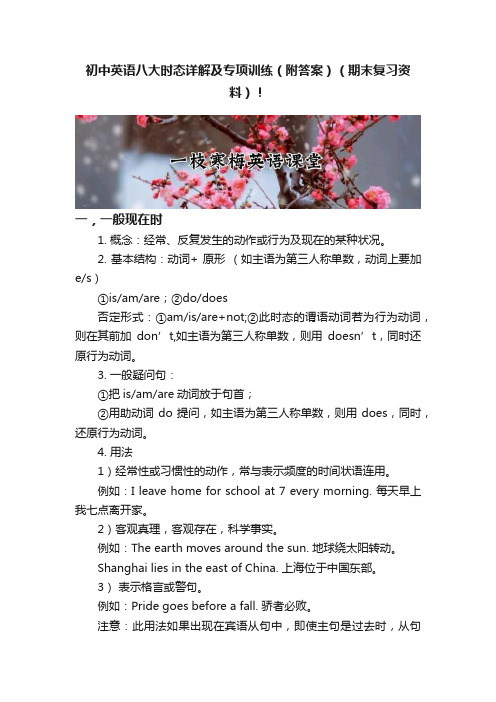
初中英语八大时态详解及专项训练(附答案)(期末复习资料)!一,一般现在时1. 概念:经常、反复发生的动作或行为及现在的某种状况。
2. 基本结构:动词+ 原形(如主语为第三人称单数,动词上要加e/s)①is/am/are;②do/does否定形式:①am/is/are+not;②此时态的谓语动词若为行为动词,则在其前加don’t,如主语为第三人称单数,则用doesn’t,同时还原行为动词。
3. 一般疑问句:①把is/am/are动词放于句首;②用助动词do提问,如主语为第三人称单数,则用does,同时,还原行为动词。
4. 用法1)经常性或习惯性的动作,常与表示频度的时间状语连用。
例如:I leave home for school at 7 every morning. 每天早上我七点离开家。
2)客观真理,客观存在,科学事实。
例如:The earth moves around the sun. 地球绕太阳转动。
Shanghai lies in the east of China. 上海位于中国东部。
3)表示格言或警句。
例如:Pride goes before a fall. 骄者必败。
注意:此用法如果出现在宾语从句中,即使主句是过去时,从句谓语也要用一般现在时。
例如:Columbus proved that the earth is round. 哥伦布证实了地球是圆的。
4)现在时刻的状态、能力、性格、个性。
例如:I don't want so much. 我不要那么多。
He writes good English but does not speak well.他英语写得不错,讲的可不行。
5)一般现在时表示将来含义。
a. 下列动词come, go, arrive, leave, start, begin, return的一般现在时可以表示将来,主要用来表示在时间上已确定或安排好的事情。
例如:The train leaves at six tomorrow morning. 火车明天上午六点开。
(word完整版)初中英语时态讲解及练习(含答案),推荐文档

时态1. 一般现在时●形式:do does(单数第三人称)●意义:一般现在时表示客观的、普遍性的真理以及经常性的事件。
●用法:A) 表示现在发生的动作、情况、状态和特征。
B) 经常性、习惯性动作。
e.g.:He always helps others. (他总是帮助别人。
)He often goes to the gym.C) 客观事实和普遍真理。
尤其要注意,如果前后文不是一般现在时,则无法保持主句、从句时态一致。
e.g.: The sun rises in the east and sets in the west.Knowledge is power.●这一用法场合一些表动作频率的时间副词连用:1). 表示肯定的频率副词:always, frequently, usually, sometimes, generally, occasionally, often etc.2). 表示否定的频率副词:never, seldom, rarely etc.➢这些副词的位置:在Be动词后,实义动词前。
e.g. He is always late.2. 一般过去时●形式:did●意义:一般过去时表示在过去的某一特定时间发生和结束的活动或情况。
●用法:A) 表示过去某个时间发生的动作或情况。
e.g.: I saw him in the library yesterday morning. (有特定的时间状语)➢yesterday, yesterday evening, last night/month/spring/year, the night before last(前天晚上),three days/months/years ago, in 1999 etc.。
这些时间状语之前不用加介词。
B) 表示过去习惯性动作,一直持续或反复发生的动作,此时可与表示拼读的时间副词连用。
e.g.: I slept for eight hours last night. (表示在过去某一段时间内持续的动作,但这动作现在已经结束了)3. 一般将来时●形式:will/shall do或be going to do●意义:一般将来时表示在未来的某个时间将要发生的某个动作或状态。
初中英语五个时态专题练习和答案(复习可用)
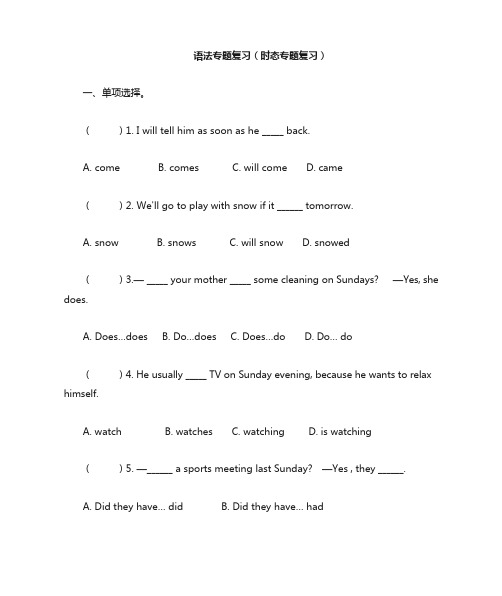
A. snow
B. snows
C. will snow D. snowed
( does.
)3.— _____ your mother _____ some cleaning on Sundays? —Yes, she
A. Does…does B. Do…does C. Does…do D. Do… do
( )11. You _____ me waiting for two hours. I _____ for you since five.
A. kept…waited
B. have kept…waited
C. kept…have waited D. have kept…have waited
( )12. —Where _____John _____?
6. We_________ (have) a good time in the Summer Palace last Sunday.
7. If it _________________ (not rain) tomorrow, we'll have a football match.
8. Don't forget _____________ (close) the window when you leave the room.
A. got to
B. reached C. arrive in D. reach
( )10. She ______ to school yesterday because of the strong wind and heavy rain.
A. goes B. went C. doesn’t go D. didn’t go
初中英语时态综合练习(附带答案)

英语综合时态练习一.各种时态下的动词形式1.一般现在时:2.一般过去时:3.一般将来时:4.现在进行时:5.过去进行时:6.现在完成时:7.过去完成时:8.过去将来时:二.单选1 .My sister _____ the Youth League last year. She _____ a Youth League member for about a year now.A.joined…has becomeB. joined…has beenC. has joined…has beenD. did join…had been2. I’ll talk to him when he ______.A. comeB. will comeC. comesD. came3. They _____ supper when we _____ into the room.A. are having…wentB. were having…goC. were having…wentD. are having…go4. We’ll go climbing if it _____ tomorrow.A. won’t rainB. did rainC. isn’t rainD. doesn’t rain5. I don’t know if it _____ tomorrow.A. will rainB. rainsC. rainedD. is rain6. Most people ____ TV.A. enjoy to watchB. enjoy watchC. enjoy watchingD. enjoys watching7. Father ____ his cap and went out.A. put onB. puts onC. had putD. will put on8. How long _____ your uncle ____ in the army ?A. has…joinedB. has…beenC. does…joinD. had…joined9. Peter _____ the work in a week.A. have finishedB. finishesC. is finishingD. will finish10. The students _____ the History Museum if it _____ fine tomorrow.A. will visit….isB. will visit…will beC. would visit …wasD. would visit…would be11. Joan ____ me whether I _____ the book before.A. asked…had readB. asked…shall readC. asked…would readD. asked…has read12._____ she _____ her lessons at seven yesterday evening ?A. Was…going overB. Is…go overC. Has…gone overD. Will…go over13. He can’t go to the cinema with me because he ____ a meeting at the moment.A. was havingB. would haveC. is havingD. had14. Both of the two dictionaries ____ very useful.A. areB. isC. wasD. am15. He _____ to me since last month.A. didn’t writeB. hadn’t writtenC. hasn’t writtenD. won’t write16. Xu Ping ____ to Japan only once.A. has goneB. had goneC. had beenD. has been17. Nobody ____ the answer.A. have knownB. knewC. didn’t knowD. are knowing18.______ you ever ____ to Nanjing ?A. Have…goneB. Have…beenC. Do…goD. Will …go19. He ____ he ____ something wrong before.A. says…wasB. say….have doneC. said…had doneD. said…would do20. He ____ me he ____ an interesting book.A. tell…would borrowB. told …will borrowC. tell…will borrowD. told …had borrowed21. Thomas Edison ____ already ____ a chemistry lab for himself by the time he ____ ten.A. has…built…wasB. had…built…wasC. would…build…wasD. was…building…is22. At the age of eleven, my grandfather _____ to work in a factory.A. beganB. has begunC. will beginD. begins23. One day while I ____ along the street, I ____ someone calling.A. walked…was hearingB. was walking…had heardC. was walking…heard24. Neither I nor he _____.A. can swims wellB. are swimming wellC. swims wellD. have swum well25. ____ you ____ where your sister has gone ?A. Did …knowB. Will…knowC. Are…knowD. Do …know26. Betty ____ morning exercises yesterday.A. not didB. don't doC. didn’t doD. won’t do27. The door of her room _____ every day.A. cleansB. are cleanedC. cleanedD. is cleaned28. No rubbish ____ for three weeks.A. collectedB. is collectedC. has collectedD. has been collected29. Another railway bridge ____ there now.A. is buildingB. is being builtC. is builtD. has been built30. ____ this film ____ last week ?A. Did…showB. Has…been shownC. Was…shownD. Was…be shown31. He told me that the composition ____ by him.A. was not writtenB. not was writtenC. is not writtenD. not is written32._____ the play ____ again next week?A. Will…put onB. Is…put onC. Will be…put onD. Will…be put on33. She ____ to a hospital at once.A. must sendB. must be sentC. must to be sentD. had to send34. Mike usually ____ up at six in the morning.A. getB. getsC. gotD. will get35. The sun _____ us light and heat.A. giveB. givesC. will giveD. often give36.Tom looked sad and cried , “ I ____ terrible right now!”A. am feelingB. feelsC. will feelD. have felt37.At that time , things _____ hard for the working people.A. isB. areC. wasD. were38. Long long ago, there ____ a farmer in a small village.A. areB. wereC. isD. was39. He is going to be a doctor when he _____.A. grow upB. grows upC. will grow upD. is going to grow up40. I’ll tell him all about it as soon as he ____.A. come backB. comes backC. will come backD. is going come back41. My little sister ____ six next month.A. will beB. shall beC. can beD. is going to42. Work hard, and you ____ catch up with the others.A. can beB. willC. shallD. are going to43. Where is Jenny ? She ____ in the next room.A. do some readingB. does some readingC. is doing some readingD. will do some reading44. Look! Tom ____ in the river.A. go swimmingB. goes swimmingC. going to swimmingD. is swimming45. His sister __ ___ cakes. That’s why her hands are all covered with flour (面粉).A. makesB. madeC. will makeD. is making46. Listen carefully ! Can you hear what the professor ____ ?A. talks aboutB. talked aboutC. is talking aboutD. will talk about47. What ____ you ____at this time yesterday ?A. do…doB. are…doingC. were…doingD. would…do48. When I got there, the Browns ____ at the lunch table.A. is sitingB. are sittingC. was sitingD. were sitting49. It suddenly began to rain while I ______ the bus.A. waitB. waitedC. was waiting forD. were waiting for50. The train will arrive _____.A. after an hourB. in an hourC. an hour laterD. for an hour51. How many English films ____ since last year ?A. do you seeB. did you seeC. have you seenD. had you seen52. Mr Smith works in Beijing. He ____ since 1978.A. has come thereB. has came thereC. has been thereD. has gone there53. Her grandma ____ for five years.A. diesB. has diedC. was deadD. has been dead54. Have you ____ heard the story about Edison ?A. everB. neverC. evenD. once55. The day after tomorrow ____ my birthday.A. will beB. should beC. may beD. is going to be56. The workers said that they would all leave if John _____.A. stayB. stayedC. staysD. was going to stay57.I’ve worked in the factory ____.A. since three yearsB. before three yearsC. since three years agoD. for three years ago58. We ____ about you just now.A. are talkingB. were talkingC. talkD. have talked59. I have just had my lunch. I _____ it at home.A. have hadB. had hadC. hadD. have60. He asked me whether I ____ the play before.A. have seenB. had seenC. sawD. was seeing61. He went to bed after he ____ his work.A. didB. doesC. has doneD. have done62. Your mother _____ you at the gate.A. waits forB. wait forC. is waiting forD. waiting for63. The train ____ here for ten minutes .A. has stoppedB. has comeC. has gotD. has been64. I’m looking for my watch. I ____ it a moment ago.A. loseB. lostC. have lostD. was lost65. When he sees me, he always ____ to me.A. smileB. is smilingC. smiledD. smiles66. By this time tomorrow, I ____ the book.A. will finish to readB. will have finished readingC. will finish readingD. will have finished to read67. Is this the first time you _____ Beijing ?A. visitB. visitedC. have visitedD. have been visiting68. I _____ to school, only to find out that it was a holiday.A. hurryB. had hurriedC. have hurriedD. hurried69. I ____ along the street when I caught sight of an old friend of mine.A. wentB. had goneC. was goingD. would go70. Can you imagine how the game _____?A. wonB. had wonC. was wonD. wins71. John was tired out. He ____ all day.A. was workingB. had been workedC. workedD. had been working72. "I’m afraid you can’t sit here." "Sorry, I ______ know."A. don’tB. can’tC. won’tD. didn’t73. He told me that he ______ to see us the next day.A. comesB. cameC. will comeD. would come74. The teacher told us that the sun ______ bigger than the earth.A. isB. wasC. has beenD. will be答案:1-5 BCCDA6-10 CABDA11-15 AACAC16-20 DBBCD21-25 AACCD26-30 CCDBC31-35 ADBBB36-40 ADDBB41-45 ABCDD46-50 CCDCB51-55 CCDAA56-60 BCBCB61-65 ACDBD66-70 BCDCC71-74 DDDA。
初中英语一轮复习时态与语态专项讲解及练习(有答案)
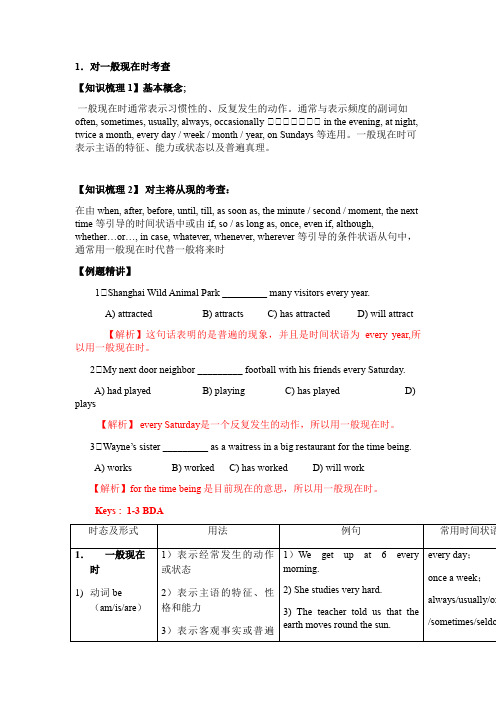
1.对一般现在时考查【知识梳理1】基本概念;一般现在时通常表示习惯性的、反复发生的动作。
通常与表示频度的副词如often, sometimes, usually, always, occasionally 等等等等等等等 in the evening, at night, twice a month, every day / week / month / year, on Sundays 等连用。
一般现在时可表示主语的特征、能力或状态以及普遍真理。
【知识梳理2】对主将从现的考查:在由 when, after, before, until, till, as soon as, the minute / second / moment, the next time 等引导的时间状语中或由 if, so / as long as, once, even if, although, whether…or…, in case, whatever, whenever, wherever 等引导的条件状语从句中,通常用一般现在时代替一般将来时【例题精讲】1等Shanghai Wild Animal Park _________ many visitors every year.A) attracted B) attracts C) has attracted D) will attract【解析】这句话表明的是普遍的现象,并且是时间状语为every year,所以用一般现在时。
2等My next door neighbor _________ football with his friends every Saturday.A) had played B) playing C) has played D) plays【解析】 every Saturday是一个反复发生的动作,所以用一般现在时。
3等Wayne’s sister _________ as a waitress in a big restaurant for the time being.A) works B) worked C) has worked D) will work【解析】for the time being是目前现在的意思,所以用一般现在时。
九年级英语时态复习练习题及答案
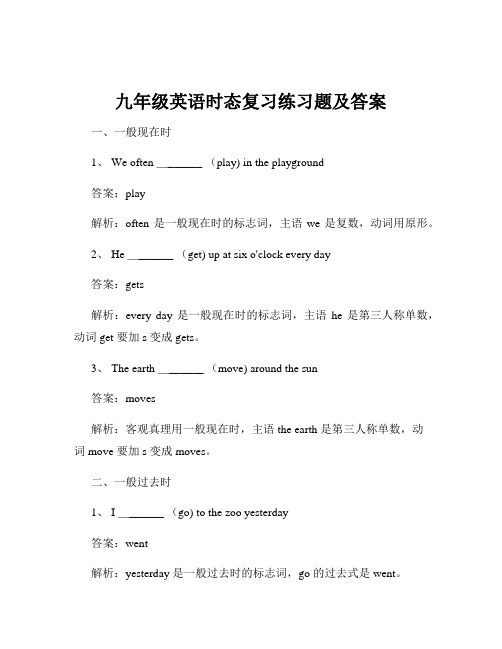
九年级英语时态复习练习题及答案一、一般现在时1、 We often _______ (play) in the playground答案:play解析:often 是一般现在时的标志词,主语 we 是复数,动词用原形。
2、 He _______ (get) up at six o'clock every day答案:gets解析:every day 是一般现在时的标志词,主语he 是第三人称单数,动词 get 要加 s 变成 gets。
3、 The earth _______ (move) around the sun答案:moves解析:客观真理用一般现在时,主语 the earth 是第三人称单数,动词 move 要加 s 变成 moves。
二、一般过去时1、 I _______ (go) to the zoo yesterday答案:went解析:yesterday 是一般过去时的标志词,go 的过去式是 went。
2、 She _______ (be) happy last week答案:was解析:last week 是一般过去时的标志词,主语 she 是第三人称单数,be 动词用 was。
3、 They _______ (not do) their homework last night答案:didn't do解析:last night 是一般过去时的标志词,否定句要用助动词didn't,后面接动词原形 do。
三、一般将来时1、 We _______ (have) a party next week答案:will have / are going to have解析:next week 是一般将来时的标志词,可以用 will +动词原形或者 be going to +动词原形的结构。
2、 He _______ (come) back tomorrow答案:will come / is going to come解析:tomorrow 是一般将来时的标志词,同理可用 will +动词原形或者 be going to +动词原形。
(完整版)初中英语时态综合练习,附答案
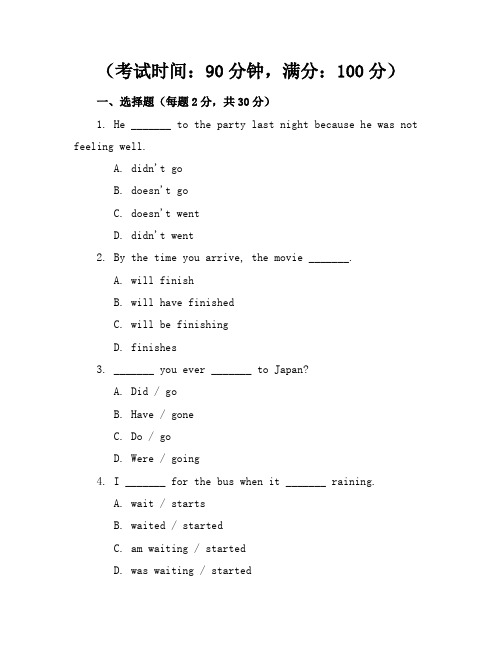
(考试时间:90分钟,满分:100分)一、选择题(每题2分,共30分)1. He _______ to the party last night because he was not feeling well.A. didn't goB. doesn't goC. doesn't wentD. didn't went2. By the time you arrive, the movie _______.A. will finishB. will have finishedC. will be finishingD. finishes3. _______ you ever _______ to Japan?A. Did / goB. Have / goneC. Do / goD. Were / going4. I _______ for the bus when it _______ raining.A. wait / startsB. waited / startedC. am waiting / startedD. was waiting / started5. _______ you like some more coffee?A. CouldB. WouldC. ShouldD. Might6. She _______ her homework when her friend _______.A. was doing / calledB. did / has calledC. does / callsD. is doing / calls7. _______ you _______ the book yet?A. Did / readB. Have / readC. Do / readD. Are / reading8. They _______ in the park when it _______.A. play / is rainingB. played / rainedC. are playing / rainsD. were playing / started to rain9. I _______ her for two years before we got married.A. knowB. knewC. have knownD. had known10. _______ you like _______ to the concert with me?A. Do / to goB. Would / goingC. Are / goingD. Will / go二、判断题(每题1分,共20分)1. The past perfect tense is used to describe an action that happened before another past action. (True/False)2. The simple present tense can be used to talk about scheduled future events. (True/False)3. The present perfect continuous tense is used to describe an action that started in the past and is still continuing in the present. (True/False)4. The past continuous tense is used to describe an action that was happening at a specific time in the past. (True/False)6. The simple past tense is used to describe an action that happened and is now finished. (True/False)7. The present continuous tense is used to describe an action that is happening now. (True/False)8. The past perfect continuous tense is used to describe an action that was ongoing before another past action. (True/False)9. The future simple tense is used to talk about spontaneous future decisions. (True/False)10. The present perfect tense is used to describe an action that happened at an unspecified time before now. (True/False)三、填空题(每空1分,共10分)1. I _______ (to eat) dinner when the phone _______ (to ring).2. By next week, she _______ (to finish) her project.3. They _______ (to travel) to London last summer.4. _______ you _______ (to see) the new movie yet?5. He _______ (to study) English for five years.四、简答题(每题10分,共10分)1. Explain the difference between the simple past and the past continuous tense.2. When do we use the present perfect tense?五、综合题(1和2两题7分,3和4两题8分,共30分)1. Read the following conversation and fill in the blanks with the correct form of the verb in brackets.A: _______ you _______ (to see) Tom recently?B: Yes, I _______ (to see) him last week. He _______ (to tell) me about his new job.2. Complete the following sentences using the correct form of the verb in brackets.1. I _______ (to go) to the gym after work.2. She _______ (to have) a meeting at 10 am tomorrow.3. They _______ (to travel) to Paris next month.3. Write a short paragraph (about 5070 words) using at least three different tenses. Topic: "My Typical Day"4. Read the passage and answer the questions.Yesterday, Sarah and her8. 改错题(每题2分,共10分)1. I has finished my homework.2. She didn't went to the party.3. He was watching TV when I called him.4. They have arrived at the airport.5. I didn't saw him yesterday.9. 完形填空题(每题2分,共10分)Once upon a time, there was a little girl named Snow White. She lived in a beautiful castle with her stepmother, the evil queen. The queen was very jealous of Snow White's beauty, so she (1) _______ (to hire) a huntsman to kill her. However, when the huntsman saw Snow White, he couldn't bring himself to harm her. Instead, he (2) _______ (to warn) her and let her escape into the forest.In the forest, Snow White (3) _______ (to find) a small cottage. She (4) _______ (to be) tired and hungry, so she (5)_______ (to go) inside and (6) _______ (to eat) some food. After that, she (7) _______ (to fall) asleep.Meanwhile, the queen (8) _______ (to use) her magicmirror to find out where Snow White (9) _______ (to be). When she (10) _______ (to discover) that Snow White was still alive, she (11) _______ (to make) a poisoned apple that would put Snow White into a deep sleep.The queen (12) _______ (to disguise) herself as an old woman and (13) _______ (to go) to the cottage where Snow White (14) _______ (to live). She (15) _______ (to convince) Snow White to bite the poisoned apple, and soon Snow White (16) _______ (to fall) into a deep sleep.Fortunately, a prince (17) _______ (to pass) the cottage and (18) _______ (to see) Snow White. He (19) _______ (to kiss) her, and she (20) _______ (to wake) up. They (21)_______ (to get) married and (22) _______ (to live) happily ever after.10. 阅读理解题(每题3分,共15分)Read the following passage and answer the questions.Questions:1. What is the Eiffel Tower?2. Where is the Eiffel Tower located?3. Who designed the Eiffel Tower?4. How tall is the Eiffel Tower?5. Why is the Eiffel Tower famous?11. 写作题(每题10分,共10分)Write a short essay (about 100120 words) on the topic "My Favorite Holiday". Include reasons why it is your favorite holiday and describe how you usually celebrate it.12. 翻译题(每题5分,共10分)1. They have been studying English for five years.2. I didn't understand the question, so I asked the teacher for help.13. 听力题(每题2分,共10分)Listen to the recording and answer the questions.1. What did the man do yesterday?2. Where will they go for their vacation?3. Why did she miss the meeting?4. When will the train arrive?5. How long has he been working here?14. 语法填空题(每题2分,共10分)Fill in the blanks with the correct form of the verb in brackets.1. If I (to have) enough money, I (to buy) a new car.2. By the time you arrive, the movie (to finish).3. They (to watch) TV when the phone (to ring).4. He (to be) tired because he (to work) all day.5. I (to meet) her two years ago.15. 口语表达题(每题5分,共10分)1. Describe your favorite book and explain why you like it.2. Talk about a memorable experience you had while traveling.。
初中英语八大时态全套精讲及练习题(附答案)
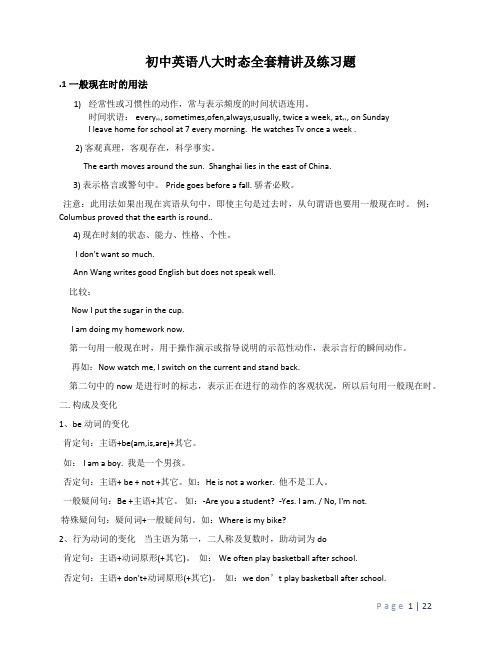
初中英语八大时态全套精讲及练习题.1 一般现在时的用法1)经常性或习惯性的动作,常与表示频度的时间状语连用。
时间状语: every…, sometimes,ofen,always,usually, twice a week, at…, on SundayI leave home for school at 7 every morning. He watches Tv once a week .2) 客观真理,客观存在,科学事实。
The earth moves around the sun. Shanghai lies in the east of China.3) 表示格言或警句中。
Pride goes before a fall. 骄者必败。
注意:此用法如果出现在宾语从句中,即使主句是过去时,从句谓语也要用一般现在时。
例:Columbus proved that the earth is round..4) 现在时刻的状态、能力、性格、个性。
I don't want so much.Ann Wang writes good English but does not speak well.比较:Now I put the sugar in the cup.I am doing my homework now.第一句用一般现在时,用于操作演示或指导说明的示范性动作,表示言行的瞬间动作。
再如:Now watch me, I switch on the current and stand back.第二句中的now是进行时的标志,表示正在进行的动作的客观状况,所以后句用一般现在时。
二. 构成及变化1、be动词的变化肯定句:主语+be(am,is,are)+其它。
如: I am a boy. 我是一个男孩。
否定句:主语+ be + not +其它。
如:He is not a worker. 他不是工人。
初中英语时态综合复习讲练(含答案)
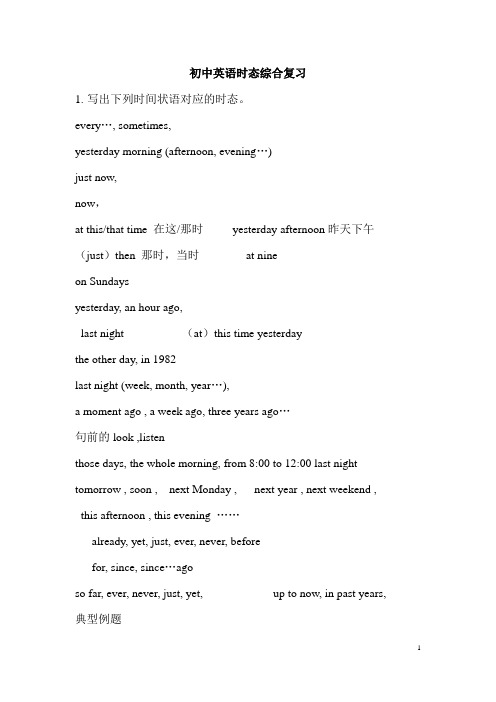
初中英语时态综合复习1.写出下列时间状语对应的时态。
every…, sometimes,yesterday morning (afternoon, evening…)just now,now,at this/that time 在这/那时yesterday afternoon昨天下午(just)then 那时,当时at nineon Sundaysyesterday, an hour ago,last night (at)this time yesterdaythe other day, in 1982last night (week, month, year…),a moment ago , a week ago, three years ago…句前的look ,listenthose days, the whole morning, from 8:00 to 12:00 last night tomorrow , soon ,next Monday , next year , next weekend , this afternoon , this evening ……already, yet, just, ever, never, beforefor, since, since…agoso far, ever, never, just, yet,up to now, in past years, 典型例题(1) ---Do you know our town at all?---No, this is the first time I ___ here.A. wasB. have beenC. cameD. am coming(1)He said he________me a present unless I_______ in doing the experiment.A. had not given; had not succeededB. would not give; succeedC. will not give; succeedD. would not give; will succeed. this morning, the whole morning, all day yesterday, from nine to ten last evening, when, whileMary ___ a dress when she cut her finger.A. madeB. is makingC. was makingD. makesAs she ___ the newspaper, Granny ___ asleep.A.read;was fallingB. was reading;fellC. was reading;was fallingD. read;fell---- Your phone number again? I ___ quite catch it.---- It's 69568442.A. didn'tB. couldn'tC. don'tD. can't巩固练习:(聪明的你一定能全部做对)1.2.3.4.5.(see)you at four yesterday afternoon?6., her son ____________ (play) outside the room.7.It ________ (begin) to we _____________(work) in the field.8.(go) out. {go out 意为熄灭}9.——------Oh, I ____________ (read) some books on science.10. Girls ___________(dance) boys ____________(sing) at the party.11.--- Did you see Tim just now?--- Yes. He __________ (fish) by the river.the teacher ______ (come) into the classroom, the students __________(laugh)loudly.写出下列时间状语对应的时态。
初三英语时态综合复习与运用练习题40题(带答案)
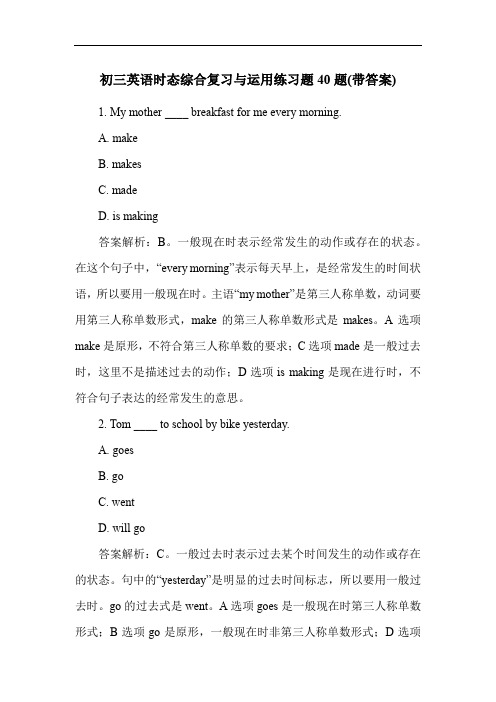
初三英语时态综合复习与运用练习题40题(带答案)1. My mother ____ breakfast for me every morning.A. makeB. makesC. madeD. is making答案解析:B。
一般现在时表示经常发生的动作或存在的状态。
在这个句子中,“every morning”表示每天早上,是经常发生的时间状语,所以要用一般现在时。
主语“my mother”是第三人称单数,动词要用第三人称单数形式,make的第三人称单数形式是makes。
A选项make是原形,不符合第三人称单数的要求;C选项made是一般过去时,这里不是描述过去的动作;D选项is making是现在进行时,不符合句子表达的经常发生的意思。
2. Tom ____ to school by bike yesterday.A. goesB. goC. wentD. will go答案解析:C。
一般过去时表示过去某个时间发生的动作或存在的状态。
句中的“yesterday”是明显的过去时间标志,所以要用一般过去时。
go的过去式是went。
A选项goes是一般现在时第三人称单数形式;B选项go是原形,一般现在时非第三人称单数形式;D选项will go是一般将来时,表示将来要发生的动作,均不符合题意。
3. We often ____ our homework in the evening.A. doB. doesC. didD. are doing答案解析:A。
一般现在时用于表示经常、习惯性的动作。
“often”表示经常,是一般现在时的标志词。
主语“we”是复数,动词用原形。
B选项does是一般现在时第三人称单数形式;C选项did是一般过去时;D选项are doing是现在进行时,都不符合句子语境。
4. She ____ a book last night.A. readsB. readC. is readingD. has read答案解析:B。
中考初中英语主要时态系列讲座(一)---一般现在时精讲及练习(含答案) (2)
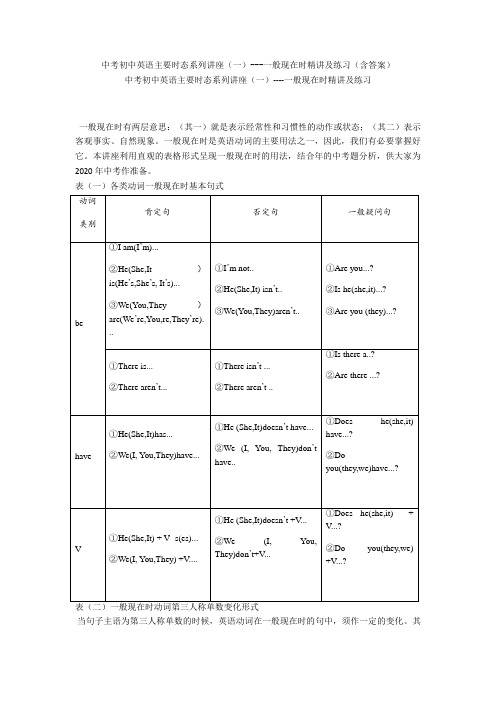
中考初中英语主要时态系列讲座(一)---一般现在时精讲及练习(含答案)中考初中英语主要时态系列讲座(一)----一般现在时精讲及练习一般现在时有两层意思:(其一)就是表示经常性和习惯性的动作或状态;(其二)表示客观事实、自然现象。
一般现在时是英语动词的主要用法之一,因此,我们有必要掌握好它。
本讲座利用直观的表格形式呈现一般现在时的用法,结合年的中考题分析,供大家为2020年中考作准备。
表(一)各类动词一般现在时基本句式当句子主语为第三人称单数的时候,英语动词在一般现在时的句中,须作一定的变化。
其变化规则与名词单数变复数相同。
具体见下表:表(三)一般现在时常用时间状语由于一般现在时主要表示经常性或习惯性的动作,所以,在句中就有一些表示性惯性或经常性的副词或短语去说明动作的经常性或习惯性。
现将于一般现在时相关的这些副词或短语,归纳在表中,供大家掌握。
表(四)一般现在时的主要用法(北京) Sam ______with his friends every weekend.A. skatesB. is skatingC. has skatedD. was skating【析】正确答案:A 。
句意是:每个周末,山姆都和朋友们一起滑冰。
根据句末的频度副词短语every weekend(每周末)可知,句子表示的动作具有经常性,所以动词应使用一般现在时。
【典型考例2】(青海)----What did you learn in geography yesterday?----I learned that the sun _____ in the east.A.was risingB.risesC.rose【析】正确答案:B。
句意是:昨天的地理课上你学了什么?我学了太阳从东边升起来。
太阳从东边升起来,表示的客观事实,一种自然现象,所以,句中的动词应使用一般现在时,因此,正确答案为B。
【典型考例3】(山东临沂)---I'm getting hungry. Do you know where we can get some good food?--- Of course! There ____________ a restaurant around the comer.A. will beB. wasC. is【析】正确答案:C。
【英语】初中英语动词的时态的技巧及练习题及练习题(含答案)及解析
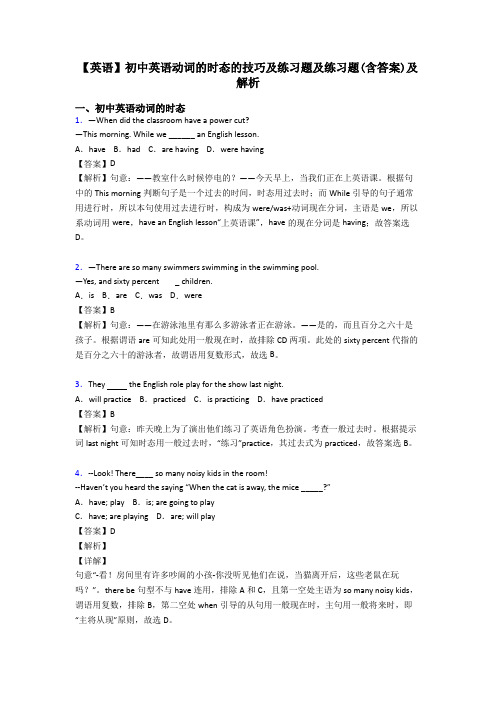
【英语】初中英语动词的时态的技巧及练习题及练习题(含答案)及解析一、初中英语动词的时态1.—When did the classroom have a power cut?—This morning. While we ______ an English lesson.A.have B.had C.are having D.were having【答案】D【解析】句意:——教室什么时候停电的?——今天早上,当我们正在上英语课。
根据句中的This morning判断句子是一个过去的时间,时态用过去时;而While引导的句子通常用进行时,所以本句使用过去进行时,构成为were/was+动词现在分词,主语是we,所以系动词用were,have an English lesson“上英语课”,have的现在分词是having;故答案选D。
2.—There are so many swimmers swimming in the swimming pool.—Yes, and sixty percent _ children.A.is B.are C.was D.were【答案】B【解析】句意:——在游泳池里有那么多游泳者正在游泳。
——是的,而且百分之六十是孩子。
根据谓语are可知此处用一般现在时,故排除CD两项。
此处的sixty percent代指的是百分之六十的游泳者,故谓语用复数形式,故选B。
3.They the English role play for the show last night.A.will practice B.practiced C.is practicing D.have practiced【答案】B【解析】句意:昨天晚上为了演出他们练习了英语角色扮演。
考查一般过去时。
根据提示词last night可知时态用一般过去时,“练习”practice,其过去式为practiced,故答案选B。
初中英语时态语态复习及专题训练100题(附答案)
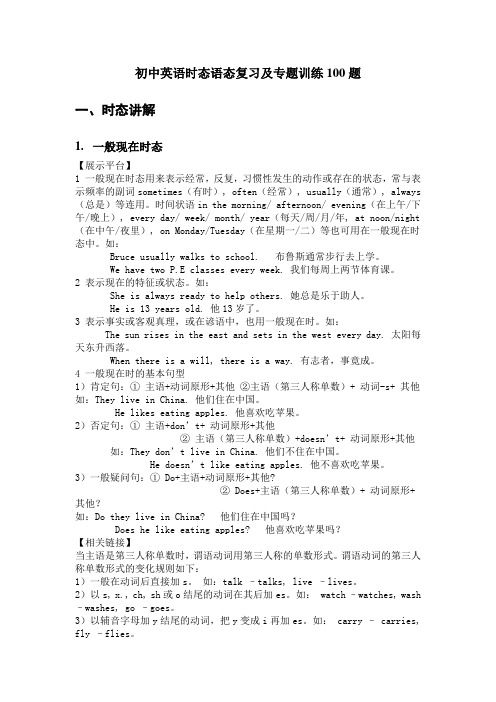
初中英语时态语态复习及专题训练100题一、时态讲解1.一般现在时态【展示平台】1 一般现在时态用来表示经常,反复,习惯性发生的动作或存在的状态,常与表示频率的副词sometimes(有时), often(经常), usually(通常), always (总是)等连用。
时间状语in the morning/ afternoon/ evening(在上午/下午/晚上), every day/ week/ month/ year(每天/周/月/年, at noon/night (在中午/夜里), on Monday/Tuesday(在星期一/二)等也可用在一般现在时态中。
如:Bruce usually walks to school. 布鲁斯通常步行去上学。
We have two P.E classes every week. 我们每周上两节体育课。
2 表示现在的特征或状态。
如:She is always ready to help others. 她总是乐于助人。
He is 13 years old. 他13岁了。
3 表示事实或客观真理,或在谚语中,也用一般现在时。
如:The sun rises in the east and sets in the west every day. 太阳每天东升西落。
When there is a will, there is a way. 有志者,事竟成。
4 一般现在时的基本句型1)肯定句:① 主语+动词原形+其他②主语(第三人称单数)+ 动词-s+ 其他如:They live in China. 他们住在中国。
He likes eating apples. 他喜欢吃苹果。
2)否定句:① 主语+do n’t+ 动词原形+其他② 主语(第三人称单数)+doesn’t+ 动词原形+其他如:They don’t live in China. 他们不住在中国。
He doesn’t like eating apples. 他不喜欢吃苹果。
初中八种英语时态精讲精练(含答案)

初中八种英语时态精讲精练(含答案)初中八种英语时态精讲精练现在时态一、用法1.表示频繁的行动、行为或存在状态。
常用的时间状语有:often,usually,always,everyday/week/month/year,sometimes,seldom,onceaweek,twiceaweek,onsundays等。
igotoschooleveryday.2.表示主语的身份或特征。
hisfatherisadoctor.tomistall.3.表达客观事实或普遍真理。
地球是圆的。
太阳比月亮大。
4.在条件状态从句和时间状语从句中,使用一般现在时来表示将来。
ifyoudon’tgosoon,you’llbelate.如果你不快去的话,你就要迟到了。
二、构成在现在时,除了单数第三人称主语外,谓语动词总是使用原形。
如果主语是单数第三人称,谓语动词的结尾应该改变(加-s或-es)。
1.添加-srun→ 跟随动词的原始形式2.以ch,sh,s,o,x结尾的动词后加-esguesses,fixes,teaches,washes,goes3.以辅音字母+y结尾的动词,先将y变为i,再加-estry→tries4.以元音字母+y结尾的动词后加-sstay→stays5.have-has三、一般现在时的句型变化。
1.肯定句(1)主语+主语+谓语他们都是高个子学生。
他来自日本。
Amisare用法公式:我用是,你用是,是连接他、她和它;用法表示单数,复数。
(2) A.主语+实词动词+其他动词b.单三人称主语+实义动词单三人称+其它heusuallygoestoschoolbybike.2.否定句(1)主语+AM/is/are+not+谓语sheisnotanurse(2)a.主语+don’t+动词原形+其它如:idon’tplaysoccerafterschool.b、一个三人主语+不+动词原型+其他他放学后不去公园。
一般问题(1)am/is/are+主语+表语?isyourmotherateacher?(2)a.do+主语+动词原形+其它?doyouspeakenglish?b、是否+单一三人主语+动词原型+其他人?你的兄弟会说话吗?4.特殊疑问句特殊疑问词+一般疑问句?你妈妈每天都做什么?特殊练习一、写出下列动词的第三人称单数形式1.学习2。
初三英语时态综合复习与运用练习题40题含答案解析
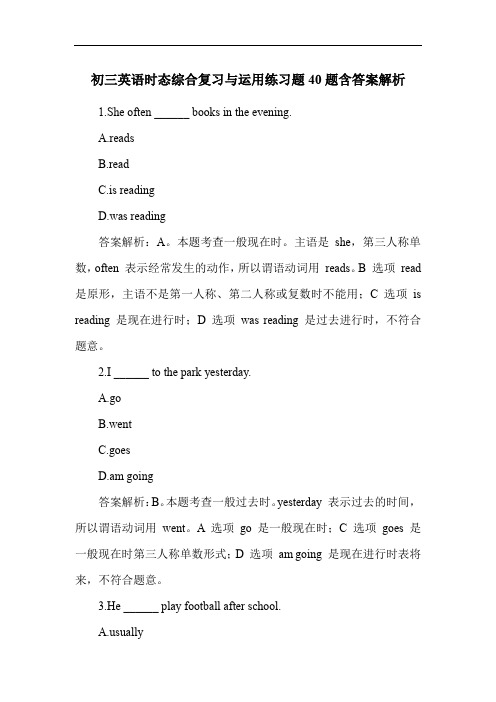
初三英语时态综合复习与运用练习题40题含答案解析1.She often ______ books in the evening.A.readsB.readC.is readingD.was reading答案解析:A。
本题考查一般现在时。
主语是she,第三人称单数,often 表示经常发生的动作,所以谓语动词用reads。
B 选项read 是原形,主语不是第一人称、第二人称或复数时不能用;C 选项is reading 是现在进行时;D 选项was reading 是过去进行时,不符合题意。
2.I ______ to the park yesterday.A.goB.wentC.goesD.am going答案解析:B。
本题考查一般过去时。
yesterday 表示过去的时间,所以谓语动词用went。
A 选项go 是一般现在时;C 选项goes 是一般现在时第三人称单数形式;D 选项am going 是现在进行时表将来,不符合题意。
3.He ______ play football after school.uallyualC.is usuallyually is答案解析:A。
本题考查一般现在时。
usually 是副词,修饰动词play,B 选项usual 是形容词不能修饰动词;C 选项is usually 和D 选项usually is 语序错误且不符合题意。
4.They ______ a good time last weekend.A.haveB.hadC.hasD.is having答案解析:B。
本题考查一般过去时。
last weekend 表示过去的时间,所以谓语动词用had。
A 选项have 是一般现在时;C 选项has 是一般现在时第三人称单数形式;D 选项is having 是现在进行时,不符合题意。
5.My mother ______ cooking every day.A.likeB.likesC.likingD.is liking答案解析:B。
初中英语八大时态讲解及练习(含答案)
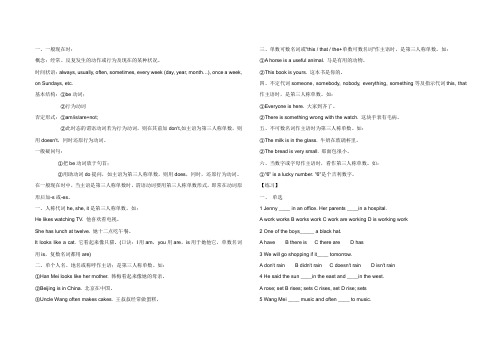
一、一般现在时:概念:经常、反复发生的动作或行为及现在的某种状况。
时间状语:always, usually, often, sometimes, every week (day, year, month…), once a week, on Sundays, etc.基本结构:①be动词;②行为动词否定形式:①am/is/are+not;②此时态的谓语动词若为行为动词,则在其前加don't,如主语为第三人称单数,则用doesn't,同时还原行为动词。
一般疑问句:①把be动词放于句首;②用助动词do提问,如主语为第三人称单数,则用does,同时,还原行为动词。
在一般现在时中,当主语是第三人称单数时,谓语动词要用第三人称单数形式,即常在动词原形后加-s或-es。
一、人称代词he, she, it是第三人称单数。
如:He likes watching TV. 他喜欢看电视。
She has lunch at twelve. 她十二点吃午餐。
It looks like a cat. 它看起来像只猫。
(口诀:I用am,you用are,is用于她他它,单数名词用is,复数名词都用are)二、单个人名、地名或称呼作主语;是第三人称单数。
如:①Han Mei looks like her mother. 韩梅看起来像她的母亲。
②Beijing is in China. 北京在中国。
③Uncle Wang often makes cakes. 王叔叔经常做蛋糕。
三、单数可数名词或"this / that / the+单数可数名词"作主语时,是第三人称单数。
如:①A horse is a useful animal. 马是有用的动物。
②This book is yours. 这本书是你的。
四、不定代词someone, somebody, nobody, everything, something等及指示代词this, that 作主语时,是第三人称单数。
九年级英语时态综合练习题50题(带答案)
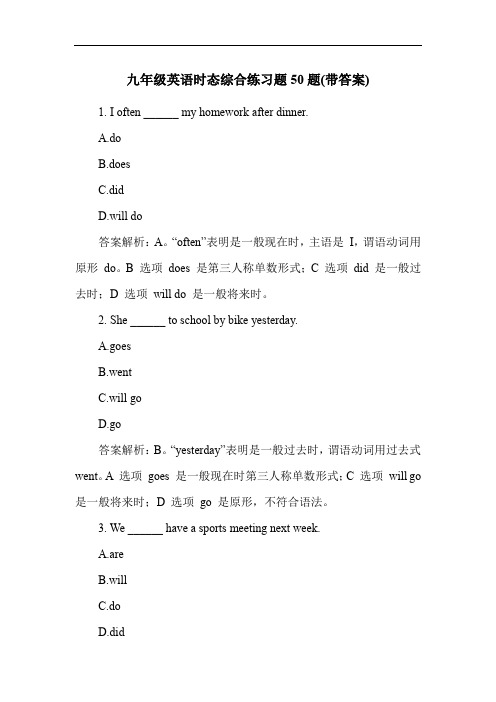
九年级英语时态综合练习题50题(带答案)1. I often ______ my homework after dinner.A.doB.doesC.didD.will do答案解析:A。
“often”表明是一般现在时,主语是I,谓语动词用原形do。
B 选项does 是第三人称单数形式;C 选项did 是一般过去时;D 选项will do 是一般将来时。
2. She ______ to school by bike yesterday.A.goesB.wentC.will goD.go答案解析:B。
“yesterday”表明是一般过去时,谓语动词用过去式went。
A 选项goes 是一般现在时第三人称单数形式;C 选项will go 是一般将来时;D 选项go 是原形,不符合语法。
3. We ______ have a sports meeting next week.A.areB.willC.doD.did答案解析:B。
“next week”表明是一般将来时,用will+动词原形。
A 选项are 后面不能直接跟动词原形have;C 选项do 用于一般现在时;D 选项did 用于一般过去时。
4. My father ______ in the factory every day.A.workB.worksC.workedD.will work答案解析:B。
“every day”表明是一般现在时,主语是第三人称单数father,谓语动词用works。
A 选项work 是原形;C 选项worked 是一般过去时;D 选项will work 是一般将来时。
5. They ______ football last Sunday.A.playB.playedC.will playD.plays答案解析:B。
“last Sunday”表明是一般过去时,谓语动词用过去式played。
A 选项play 是一般现在时原形;C 选项will play 是一般将来时;D 选项plays 是一般现在时第三人称单数形式。
- 1、下载文档前请自行甄别文档内容的完整性,平台不提供额外的编辑、内容补充、找答案等附加服务。
- 2、"仅部分预览"的文档,不可在线预览部分如存在完整性等问题,可反馈申请退款(可完整预览的文档不适用该条件!)。
- 3、如文档侵犯您的权益,请联系客服反馈,我们会尽快为您处理(人工客服工作时间:9:00-18:30)。
初中英语时态综合复习1.写出下列时间状语对应的时态。
every…, sometimes,yesterday morning (afternoon, evening…)just now,now,at this/that time 在这/那时yesterday afternoon昨天下午(just)then 那时,当时at nineon Sundaysyesterday, an hour ago,last night (at)this time yesterdaythe other day, in 1982last night (week, month, year…),…a moment ago , a week ago, three years ago句前的look ,listenthose days, the whole morning, from 8:00 to 12:00 last night tomorrow , soon ,next Monday , next year , next weekend , this afternoon , this evening ……already, yet, just, ever, never, beforefor, since, since…agoso far, ever, never, just, yet,up to now, in past years, 典型例题(1) ---Do you know our town at all?---No, this is the first time I ___ here.A. wasB. have beenC. cameD. am coming(1)He said he________me a present unless I_______ in doing the experiment.A. had not given; had not succeededB. would not give; succeedC. will not give; succeedD. would not give; will succeed.this morning, the whole morning, all day yesterday, from nine to ten last evening, when, whileMary ___ a dress when she cut her finger.A. madeB. is makingC. was makingD. makesAs she ___ the newspaper, Granny ___ asleep.A.read;was fallingB. was reading;fellC. was reading;was fallingD. read;fell---- Your phone number again? I ___ quite catch it.---- It's 69568442.A. didn'tB. couldn'tC. don'tD. can't巩固练习:(聪明的你一定能全部做对)1.Simon _____________ (make) a model plane at 8:00 a.m. 2.Peter ______________(do) his homework at seven last night. 3.They ____________ (watch) a football match from 7:00 to 9:00 last night.4.He _____________(try) to draw a plane on the blackboard at that time.5.What book ________ you ____________(read) when I ________ (see)you at four yesterday afternoon?6.While she __________ (watch) TV, her son ____________ (play) outside the room.7.It ________ (begin) to rain while we _____________(work) in the field.8.I ________ (do) my homework last night when the light _______ (go) out. {go out 意为熄灭}9.——I saw you in the reading room yesterday , Tom. What were you doing?------Oh, I ____________ (read) some books on science.10. Girls ___________(dance) while boys ____________(sing) at the party.11.--- Did you see Tim just now?--- Yes. He __________ (fish) by the river.12.When the teacher ______ (come) into the classroom, the students __________(laugh)loudly.写出下列时间状语对应的时态。
every …, sometimes,at …, on Sunday,yesterday, last week, an hour ago, the other day, in 1982,just nownext…, tomorrow, in+时间,for, since, so far, ever, never, just, yet, till/until, up to now, in past years, always, recently动词时态巩固练习50题( )1. There _______ no hospitals in my hometown fifty years ago. A. is B. are C. was D. were( )2. --- Who sings best in your class? --- Jenny _______.A. doB. didC. doesD. has done( )3. --- _____ the young girl _____ the old man clean his room every day? --- Yes, she does.A. Does; helpB. Has; helpedC. Did; helpD. Do; helps( )4. --- Can I go to Beijing for my holiday, Dad? --- You can when you _______ a bit older.A. will getB. getC. are gettingD. got( )5. --- What does Linda often do in the evening?--- She often _______ her homework, but on the evening of March 12 she _______ TV.A.does; watchesB. is doing; watchedC. does; watchedD. is doing; was watching( )6. Our geography teacher told us yesterday that the earth _______ around the sun.A. was movingB. movedC. has movedD. moves( )7. If he _______harder, he will catch up with us soon.A. studyB. studiesC. will studyD. studied( )8. --- Don’t forget to ask him to write to me.o you.--- I won’t. As soon as he _______, I’ll ask him to write tA. will comeB. cameC. comesD. is coming( )9. --- Do you like this silk dress?--- Yes, I do. It _______ so soft and comfortable.A. is feelingB. feelsC. has feltD. is felt______ here. ( )10. Oh, it’s you. I’m sorry I _______ know you _C. didn’t; wereD. don’t; wereA. don’t; areB. didn’t; are( )11. Mr Lu Xun died in 1936. He _______ a lot of famous novels.A. wroteB. was writingC. has writtenD. would write ( )12. --- Your telephone number again? I _______ quite catch it. --- It’s 2567321.A. can’tB. couldn’tC. don’tD. didn’t( )13. --- How was your weekend on the farm?--- Great! We _______ with the farmers.A. enjoy ourselvesB. went fishingC. will workD. make friends ( )14. --- What did Mr Jones do before he moved here?--- He _______ a city bus for over twenty-five years.A. is drivingB. droveC. has drivenD. drives( )15. Jane _______ a new dress every month when she was in Shanghai.A. buysB. is buyingC. boughtD. will buy( )16. --- Liu Mei can’t come tonight.--- Why? But she _______ me she would come.A. tellsB. toldC. is toldD. had told( )17. He turned off the light and then _______.A. leavesB. has leftC. will leaveD. left( )18. --- Keep quiet, please. They _______ a meeting. --- Sorry.A. haveB. hadC. are havingD. have had( )19. --- Jimmy is leaving for a holiday. --- Really? Where _______ he _______?A. has; goneB. will; goC. did; goD. would; go( )20. Frank _______ to see his grandma if he _______ free tomorrow.A.will come; will beB. comes; isC. will come; isD. comes; will be( )21. There _______ a talk on science in our school next Monday.A. will giveB. will beC. is going to giveD. is( )22. --- Shall we go shopping now?--- Sorry, I can’t. I _______ my shirts.A. washB. washesC. washedD. am washing( )23. Hurry up! We’re a ll waiting for you. I _______ for an important phone call. Go without me.A. waitB. was waitingC. am waitingD. waited( )24. --- Did you see Tom at the party? --- No, he _______ by the time I got there.A. had leftB. was leavingC. leftD. has left( )25. --- Is this raincoat yours? --- No, mine _______ there behind the door.A. has hungB. is hangingC. hungD. will hang( )26. --- _______ you _______ TV at the moment? --- No, you can turn it off.A. Did; watchB. Are; watchingC. Do; watchD. Have; watchedthink Jim saw me; he _______ a book at that moment. ( )27. I don’tA. just readB. has just readC. was just readingD. had just read ( )28. Mr Smith _______a book about China last year but I don’t know whether he has finished it.A. has writtenB. wroteC. had writtenD. was writing( )29. --- I called you at seven yesterday evening, but there was no answer.--- Oh, I am sorry. I _______ dinner at my friend’s home. A. am having B. had C. was having D. have had( )30. --- Do you know Miss Wang?--- Yes. I first met her two years ago. She _______ at a radio shop at that time.A. was workingB. has workedC. is workingD. had worked( )31. Mr White _______ the newspaper, while his daughter_______TV.A.read; was watchingB. was reading; watchedC. was reading; was watchingD. read; watched( )32. --- I _______ you at the meeting. Why? --- I was ill.A. sawB. have seenC. not seeD. didn’t see( )33. When the teacher came in, the students _______ about the new film.A. are talkingB. were talkingC. talkedD. talks( )34. The 2004 Athens Olympic Games _______ on August 13.A. has begunB. lastedC. beganD. has lasted( )35. Hurry up! The play _______ for ten minutes.A. has been onB. has begunC. had begunD. began( )36. --- May I speak to Mr Smith? --- Sorry, he _______ Australia.But he _______ in two days.A. has been to; will come backB. has gone to; will be backbackC. has been in; would come backD. is leaving for; doesn’t come ( )37. I can’t go to see the film tonight, because I ______ my ticket.A. have lostB. lostC. will loseD. was losing( )38. --- What do you think of the film Harry Potter? --- It is very nice. I _______ it twice.A. will seeB. have seenC. sawD. see( )39. We _______to learn English five years ago. We _______ it for five years up to now.A.began; learnedB. begin; have learnedC. have begun; had learnedD. began; have learned( )40. --- What a nice bike! How long _______ you _______ it?--- Just two weeks.A. have; boughtB. did; buyC. have; hadD. are; having( )41. You don’t have to describe her. I _______ her several times.A. had metB. have metC. metD. meet( )42. --- I’m sorry to have kept you waiting.--- Oh, not at all. I_______ here only a few minutes.A. have comeB. had beenC. wasD. have been( )43. --- _______ my dictionary anywhere?--- Yes. I saw it on your desk a moment ago.A. Have you seenB. Do you seeC. Had you seenD. Would you see--- What do you ( )44. --- I haven’t heard from Li Jun for a long time.think _______ to him?A. was happeningB. to happenC. has happenedD. had happened( )45. --- Do you know our town at all?--- No, this is the first time I_______ here.A. wasB. have beenC. cameD. am coming( )46. We were all surprised when he made it clear that he _______ office soon.A. leavesB. would leaveC. will leaveD. had left( )47. --- How long _______ your father _______ the Party? --- For more than twenty years.A. has; joinedB. did; joinC. has; been inD. does; join( )48. Mrs Smith _______ her keys in the office so she had to wait until her husband _______ home.A.has left; comesB. left; had comeC. had left; would comeD. had left; came( )49. Do you know Betty very well? Yes, she and I _____ friends since we met in Guangzhou last summer.A. have madeB. have becomeC. have beenD. have turned ( )50. What did your son say in the letter? He told me that he ____ the Disney World the next day.A. would visitB. has visitC. is going to visitD. will visit11 Key:1-5 DCABC 6-10 DBCBC 11-15 ADBBC 16-20 BDCBC 21-25 BDCAB 26-30 BCDCA 31-35 CDBCA 36-40 BABDC41-45 BDACB46-50 BCDCA。
